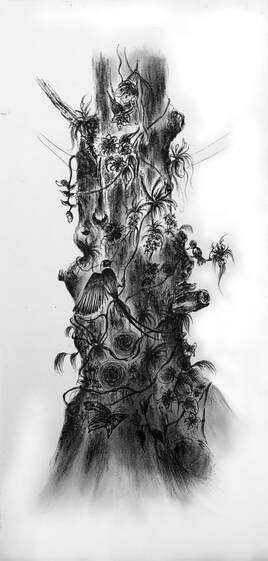I. Love
There was once a man who loved
in secret another man. Helpless
in the grip of love unbestowed he resolved
to speak to his beloved
in code. His heart sang
as he said
Fine weather I'll try Shall we go
and meant I love you, though you'll never
know.
The flaw perhaps obvious
to you was revealed to him
in time: Fine
weather I'll try Shall we go
are not reserved by
tongues for lovers.
He could barely speak
these words to others. But as he heard others
say I'll try Shall we go Be well Take this I will
Did you know he saw
that the world sang endlessly to his love: in prayers
and shouts and the buying of bread, in the rites
of the birthed, the married, the dead.
We sing to him still.
II. Wisdom
There was once a woman immersed
in a book: something lovely
and sad and funny—a bit
of all these. She was brought
up short by a word past
which she could not
read. She could see the words
like actors on a stage; she could open
the book to a later page. But past
that word every other was
b l u r r e d
or it read as if in code. Past that
word words
d r i f t e d, l i k e s n o w. Past that word
she would not know.
III. Hatred
There was once a man who hated
another man so deeply that he vowed not
to stain his mouth with the words
his enemy used. He dispatched
spies to record the hated
man's speech. He listed
and categorized the words; he committed
them to memory.
They became as land mines in his
mind. Avoiding them
his speech became
mountainous and labyrinthine, tortured
and splendid and
strange. He resurrected
archaic forms, spoke in
parables
or poetry, mapped
the contours of an internal landscape hung
with archways and bridges, redolent
with hybrid flowers, stalked
by angelic fierce animals, menaced
by turbulent seas and gazing up high-black
at new constellations.
He skirted its dark smoking
lacunae with increasing grace
and came
to bless the name of the man
whose words glowed
in pits like sacred idols.
IV. Remembrance
There was once a man who wanted
to make a record of his life but feared
that his enemies would find
the pages and use their
contents against him. So at the end of each
day he placed a single bean in a corner or wrapped
a knife with string. He pencilled a symbol on the underside
of a chair or hung a dried
flower in a window. As the days of his life
accumulated his archives
did likewise until every object he possessed was equally
precious and equally quotidian: bent
or marked or wrapped or pierced or
placed, freighted
with precisely one day's activities: shames,
joys hopes pains. He felt himself
very wealthy, surrounded by dear secrets.
A priest of five thousand
small rituals, a poet of five thousand
inscrutable works, he recorded
his days in tarnished silver, fragments
of paper in the back of a cupboard, a shoe
moldering in the garden: things as they might
be found the day after a man has died
peacefully during the night.
V. Knowledge
There was once a woman who found
in a very old book a passage
in a language
she neither read nor recognized.
She took it to all the linguists
in the academies, showed it
to wise men and demi-goddesses. It was
unknown and untranslateable. At last
she went home
and put the book on a shelf.
But
the next day she woke up, took up
the book, and turned
to the passage. Devising
a way to pronounce
the words she committed
them to memory. Then she sang
them as she swept
the floor and kneaded her bread, intoned
them before meals and before bed.
She used them to measure distance
and time: six
repetitions to the market, fourteen
to the river. She screamed them
in anger, whispered them
into lovers' ears. On the day of her death
she pronounced them one
last time and their meaning unfolded
in her mind
like a night-opening rose:
I have lived.
VI. Eternity
There was once a woman who believed
that the world would end in glory if only
someone said, said
or wrote, wrote the name (the true Name)
of God.
She took to writing,
long, long, and daily, obsessively, every
verse and mad prayer she could
devise: Fine weather Love Shall we go Shall we
go peacefully during the night I'll try I stain
my mouth I neither read nor recognize But I'll try.
In this way she passed, passed
the whole of her life, but the end
failed to come. When her eyes grew milky
and her fingers could not hold
a pen she whispered phrases so fantastical, metaphors
so dazzling, descriptions so strange and heart-
breaking that she felt sure she was
close, close to saying the Name. But
the end eluded her,
until the day a love began growing
in her chest. It grew and grew
until it filled her body and with a breath, a breath,
all, All
Words were spoken.
VII. Poetry
There was once a woman who wrote,
"Before you begin to write
pause and know this:
When you undertake
a First word you bind yourself
to a Last. It may be
Heaven, Lonely, Hoping, Snow,
Thanks or Yours or Late or Go.
This Last you will write but not see,
choose but not know."
There was once a man who loved
in secret another man. Helpless
in the grip of love unbestowed he resolved
to speak to his beloved
in code. His heart sang
as he said
Fine weather I'll try Shall we go
and meant I love you, though you'll never
know.
The flaw perhaps obvious
to you was revealed to him
in time: Fine
weather I'll try Shall we go
are not reserved by
tongues for lovers.
He could barely speak
these words to others. But as he heard others
say I'll try Shall we go Be well Take this I will
Did you know he saw
that the world sang endlessly to his love: in prayers
and shouts and the buying of bread, in the rites
of the birthed, the married, the dead.
We sing to him still.
II. Wisdom
There was once a woman immersed
in a book: something lovely
and sad and funny—a bit
of all these. She was brought
up short by a word past
which she could not
read. She could see the words
like actors on a stage; she could open
the book to a later page. But past
that word every other was
b l u r r e d
or it read as if in code. Past that
word words
d r i f t e d, l i k e s n o w. Past that word
she would not know.
III. Hatred
There was once a man who hated
another man so deeply that he vowed not
to stain his mouth with the words
his enemy used. He dispatched
spies to record the hated
man's speech. He listed
and categorized the words; he committed
them to memory.
They became as land mines in his
mind. Avoiding them
his speech became
mountainous and labyrinthine, tortured
and splendid and
strange. He resurrected
archaic forms, spoke in
parables
or poetry, mapped
the contours of an internal landscape hung
with archways and bridges, redolent
with hybrid flowers, stalked
by angelic fierce animals, menaced
by turbulent seas and gazing up high-black
at new constellations.
He skirted its dark smoking
lacunae with increasing grace
and came
to bless the name of the man
whose words glowed
in pits like sacred idols.
IV. Remembrance
There was once a man who wanted
to make a record of his life but feared
that his enemies would find
the pages and use their
contents against him. So at the end of each
day he placed a single bean in a corner or wrapped
a knife with string. He pencilled a symbol on the underside
of a chair or hung a dried
flower in a window. As the days of his life
accumulated his archives
did likewise until every object he possessed was equally
precious and equally quotidian: bent
or marked or wrapped or pierced or
placed, freighted
with precisely one day's activities: shames,
joys hopes pains. He felt himself
very wealthy, surrounded by dear secrets.
A priest of five thousand
small rituals, a poet of five thousand
inscrutable works, he recorded
his days in tarnished silver, fragments
of paper in the back of a cupboard, a shoe
moldering in the garden: things as they might
be found the day after a man has died
peacefully during the night.
V. Knowledge
There was once a woman who found
in a very old book a passage
in a language
she neither read nor recognized.
She took it to all the linguists
in the academies, showed it
to wise men and demi-goddesses. It was
unknown and untranslateable. At last
she went home
and put the book on a shelf.
But
the next day she woke up, took up
the book, and turned
to the passage. Devising
a way to pronounce
the words she committed
them to memory. Then she sang
them as she swept
the floor and kneaded her bread, intoned
them before meals and before bed.
She used them to measure distance
and time: six
repetitions to the market, fourteen
to the river. She screamed them
in anger, whispered them
into lovers' ears. On the day of her death
she pronounced them one
last time and their meaning unfolded
in her mind
like a night-opening rose:
I have lived.
VI. Eternity
There was once a woman who believed
that the world would end in glory if only
someone said, said
or wrote, wrote the name (the true Name)
of God.
She took to writing,
long, long, and daily, obsessively, every
verse and mad prayer she could
devise: Fine weather Love Shall we go Shall we
go peacefully during the night I'll try I stain
my mouth I neither read nor recognize But I'll try.
In this way she passed, passed
the whole of her life, but the end
failed to come. When her eyes grew milky
and her fingers could not hold
a pen she whispered phrases so fantastical, metaphors
so dazzling, descriptions so strange and heart-
breaking that she felt sure she was
close, close to saying the Name. But
the end eluded her,
until the day a love began growing
in her chest. It grew and grew
until it filled her body and with a breath, a breath,
all, All
Words were spoken.
VII. Poetry
There was once a woman who wrote,
"Before you begin to write
pause and know this:
When you undertake
a First word you bind yourself
to a Last. It may be
Heaven, Lonely, Hoping, Snow,
Thanks or Yours or Late or Go.
This Last you will write but not see,
choose but not know."
Sara Streett is an editor and occasional philosophy teacher residing in Poughkeepsie, NY.

